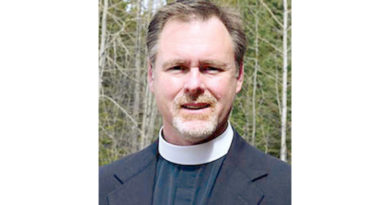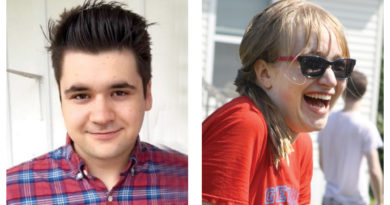TAP Interview: Bp. Joey Royal
Sharon Dewey Hetke recently talked with Bp. Joey Royal (Suffragan bishop in the Diocese of the Arctic) about his trip to the GAFCON Conference in Kigali, Rwanda.
TAP: You and your diocesan bishop, David Parsons, were the only Anglican Church of Canada bishops at GAFCON, although ANiC Bp. Dan Gifford was also in attendance. Why did you want to be there?
JR: The Arctic has had representation at the last two GAFCON meetings (2013, 2018), so our being there wasn’t unprecedented. Our reason for going has always been to remain connected with the Anglican Communion worldwide, and to express our solidarity with those parts of the Church that are growing (numerically and spiritually) and who have remained orthodox. That said, there was a sense of urgency to this gathering due to recent developments in the Church of England. The calls to “reset” or restructure the Anglican Communion have intensified, and we wanted to be involved in those conversations from the inside. It was also noteworthy that the Global South Fellowship of Anglicans (GSFA) Primates were also in attendance, which gives me hope for the possibility of working to revise the current Communion structures rather than having segments of the church formally break away from them.
TAP: Does your role on the Inter-Anglican Standing Committee on Unity, Faith & Order (IASCUFO) make it even more important for you to attend a meeting like this?
JR: Yes. At the IASCUFO meeting in Kenya last December, the Secretary General of the Anglican Communion, Bishop Anthony Poggo, expressed his hopes and vision for our work, and urged us to “reach out with the right hand of fellowship to GAFCON.” So I very much saw my presence at GAFCON to be in line with my work in IASCUFO. I was there as a bishop of the Anglican Communion, with no intention of leaving. That said, it is clear to me that a change is needed. Even the Archbishop of Canterbury has said the Instruments of Communion may need to change. So the work I’ll be doing with IASCUFO is around the possibility of restructuring the Anglican Communion, which may involve proposing a change in the Instruments of Communion. It’s still early in the process – the Anglican Consultative Council just approved our project last February – but I’m hopeful that careful theological and historical study will, God willing, produce fruit that will support the unity of the Church and the proclamation of the gospel.
TAP: I understand there was a great deal of commonality – on doctrinal issues, and in commitment to Gospel mission. But there also seems to be some questions around ecclesiology that are less clear.
JR: Yes, that’s right. I would say GAFCON is operating with an unsettled ecclesiology. There are many in GAFCON who believe the Communion should be restructured around doctrinal commitments, without any formal link to Canterbury. You could call this a “confessing church” model. However, there are structural questions around this that are unclear. In fact, the Kigali Commitment itself acknowledges the complexity around structural questions and gives a modest pledge to pray and discern them together.
But there are others there who, like me, hold out hope that the Instruments of Communion can be restructured from within, and that sufficient differentiation can be possible across the Anglican world without a total and irreparable rupture happening. And if such can be avoided it will be only because of the mercy of God, and not because of human scheming or ingenuity.
You are right though in referring to the commitment to gospel mission in GAFCON. The concern for most people in GAFCON is that liberal Provinces are distorting and obscuring the gospel, and that this distorted public witness affects not only liberal Provinces but also everyone worldwide who claims the name “Anglican.”
TAP: Picking up on something you said earlier: What about the relationship between GAFCON and the Global South Fellowship of Confessing Anglicans (GSFA)? There has, in the past, been a clearer dividing line between those two groups. Is that line now erased?
JR: Well, the line isn’t erased completely. GAFCON and GSFA remain distinct entities, although they appear to be more closely aligned. For instance, the part in the Kigali Commitment from the Primates was written by both GAFCON and GSFA Primates. What this means going forward, in terms of approach, remains to be seen. Up to now, the GSFA Primates have been working to reform the Anglican Communion from within current structures, which sometimes has involved very strong statements critical of Canterbury and liberal Provinces. But they have worked from within, attending Lambeth and participating in the other Instruments. Since GAFCON is a mixed group of Communion churches and non-Communion churches, they have engaged in more critical actions from outside the current structures – boycotting Lambeth, for instance, and planting new member Provinces alongside Communion ones.
TAP: I do wonder how it is possible to reset the Communion from outside the Communion? It’s one thing to create parallel structures, but I find it harder to understand how the office of the Archbishop of Canterbury (for example) can be reformed unless that project is taken up by those currently holding some kind of power?
JR: Yes, and that’s the point Justin Welby has made on several occasions, including in his address to the Anglican Consultative Council last February. The Instruments of Communion can change but change needs to come from within the current structures. As I mentioned earlier, this is part of the work of IASCUFO – to do theological work on this, and to bring proposals to the current Instruments.
TAP: You are an orthodox bishop in the Anglican Church of Canada – not the only one, to be sure, but in a minority position. Did the people you met at GAFCON have much awareness of your position and the situation in Canada?
JR: People were consistently surprised to learn David (Parsons) and I are in the Anglican Church of Canada. Some wondered how we could survive in such a liberal environment when we’re both conservatives. I tried to gently correct misunderstandings – for instance, that a Canadian bishop does not pledge canonical obedience to the Primate, and that the Marriage Canon has not changed, even though most Canadian bishops have permitted same-sex marriages in their dioceses. I did explain the shaky reasoning it all rests on – including Chancellor Jones’ tenuous interpretation of the Marriage Canon. Many found that whole thing incredible – so do I!
I also told people about the many orthodox Anglicans who persevere in the Anglican Church of Canada, despite liberal distractions and distortions. I hope our orthodox witness can become more visible, both in our country and worldwide, and that – by God’s grace – there can be reconciliation with our brothers and sisters in ANiC/ACNA. TAP




